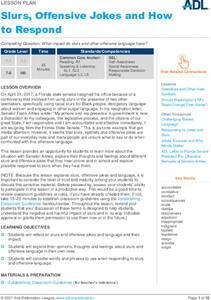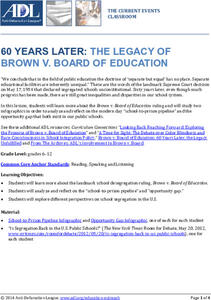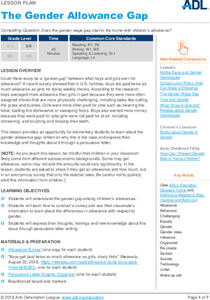Academy of American Poets
Teach This Poem: "Lines Written in Early Spring" by William Wordsworth
William Wordsworth's poem "Lines Written in Early Spring" lets learners sharpen their observation skills. Class members first closely examine the image "Flowers in Front of an Abandoned House in Demerino, Russia," listing what they...
Utah Education Network (UEN)
Know Your Literature Genres
Open the library for young readers by introducing them to the main genres and sub-genres. A podcast and two presentations identify the characteristics of the different genres. Groups then sort through a box of books and, using evidence...
National Endowment for the Humanities
Shakespeare's Julius Caesar: Leadership and a Global Stage
Shakespeare's Julius Caesar is, among other things, the study of a ruler's ambitions. Young scholars watch videos, read articles, and keep a Commonplace Book while studying the play. At the end of Act III, pupils stage the play that...
Utah Education Network (UEN)
7th Grade Poetry: Sonnet Poem
Two sonnets provide seventh graders with examples of Shakespearean sonnets. After discussing the story of the poems and analyzing their rhyme scheme and rhythm, young poets craft a Shakespearian sonnet and share their work with two...
Utah Education Network (UEN)
7th Grade Poetry: Ode Poem
Walt Whitman's "Captain, My Captain" and Robert Frost's "The Road Not Taken" provide seventh graders with examples of odes. After reading and discussing these and other examples, young poets craft an ode and respond to the ode of a...
Utah Education Network (UEN)
7th Grade Poetry: Metaphor Poem
The second activity in a five-part poetry unit asks seventh graders to construct a metaphor poem. First, pupils examine Emily Dickinson's "The Railway Train" and identify the metaphor. They then select an object and an animal and craft a...
Utah Education Network (UEN)
7th Grade Poetry: I Am Poem
A study of Alfred Noyes's poem "The Highwayman" opens a instructional activity about narrative poetry. Scholars read the poem and compare it to the animated video version using a worksheet. Learners look at models and use a template to...
National Endowment for the Humanities
"From Citizen, VI [On the Train the Woman Standing]," Claudia Rankine
Claudia Rankine's poem "From Citizen, VI [On the Train the Woman Standing]," asks readers to consider direct and more subtle forms of prejudice. After discussing the format of the poem, its tone, and the emotions expressed, class members...
Academy of American Poets
Incredible Bridges: “Cotton Candy” by Edward Hirsch
Read it, hear it, see it, do it! Young poets experience Edward Hirsch's memory poem, "Cotton Candy," by first closely reading the poem silently, then aloud, watching a video of the poet reading it, and crafting their memory poem of an...
Teach Engineering
Cosmic Rhythm
Young engineers turn poets with a hands-on activity that challenges them to apply the concept of rhythm to crafting a poem.
Anti-Defamation League
Matthew Shepard and James Byrd, Jr., Hate Crimes Prevention Act
You, too, can prevent hate crimes! Middle and high schoolers read short biographies of Mathew Shepard and James Byrd, the two men for whom the Matthew Shepard and James Byrd, Jr. Hate Crimes Prevention Act (HCPA) is named. After learning...
Anti-Defamation League
Slurs, Offensive Jokes and How to Respond
How to respond to slurs and offensive jokes is the topic of a lesson designed for middle and high schoolers. After journaling about their experiences with slurs and nasty jokes, participants read an article about a Florida State Senator...
Anti-Defamation League
60 Years Later: The Legacy of Brown v. Board of Education
Although the 1954 U.S. Supreme Court decision Brown v. Board of Education declared segregated schools unconstitutional, huge inequalities still exist in U.S. public schools. Learners analyze and discuss data presented in two...
Learning for Justice
Challenging Gender Stereotyping and Homophobia in Sports
Young learners are asked to challenge what they see as stereotyping and homophobia in sports and the arts. Participants read an article about sexual orientation in the NFL and statements from public figures like Theodore Roosevelt. They...
Curated OER
Abigail’s War: The American Revolution through the Eyes of Abigail Adams
Four lessons, performed over four weeks, pay special attention to Abigail Adams. Fifth graders analyze primary and secondary sources, read texts, discuss and write about Adams' experience during the Revolutionary War—the Battle of Bunker...
Anti-Defamation League
Pink Collar Jobs: Gender Segregation and Pay Inequality in the Workplace
Cartoons showing women in the workplace spark a discussion about being a business executive and claiming the corporate ladder. Small groups analyze data and create graphs that display essential information from the handouts. The class...
Anti-Defamation League
Gossip, Rumors and Identity
A thoughtful discussion prompts middle schoolers to reflect on gossip and rumors, what they are, their experience with them, and how some groups experience it more than others. Scenarios challenge participants to consider the impact of...
Anti-Defamation League
What is the Soul Cap and Why Was it Rejected for Olympic Use?
In 2021 the FINA, the International Swimming Federation, banned using Soul Caps in the Tokyo Olympics. Middle schoolers investigate why the committee made this decision and the resulting backlash, including charges of discrimination and...
C3 Teachers
Call for Change: What Did It Take for Women to Be Considered “Equal” to Men in New York?
An inquiry-based lesson challenges fourth graders to examine who had voting rights in New York when it was founded, women's roles, and how they entered politics. Scholars participate in thoughtful discussions and show what they know...
Anti-Defamation League
Major League Baseball and the Negro Leagues: Correcting an Injustice
It's been a long time coming! In 2020, MLB Commissioner Robert D. Manifred, Jr. stated that "the Negro Leagues would be recognized as official major leagues." Middle schoolers investigate the history of the Negro Leagues and use evidence...
Anti-Defamation League
Intent vs. Impact: Why Does it Matter?
Contrary to the popular saying, words can hurt. Words matter! Tweens and teens can reflect on how words impact others even if the intent wasn't how the words were perceived. After examining an Instagram post where Lizzo apologized for...
Anti-Defamation League
Emojis and Me
A lesson features the work of O'Plérou Grebet, a graphic designer who created a collection of emojis to represent his life in West Africa. Scholars explore the history and purpose of emojis, then read and discuss an article about...
Anti-Defamation League
The Gender Allowance Gap
Does the pay gap begin with allowance? That is the big question scholars answer in a lesson examining how gender affects how much money an individual earns. Class members conduct a survey to identify how the allowance is paid, take their...
Anti-Defamation League
What "Draw-A-Scientist" Reveals about Gender Stereotypes
What do you picture when you hear the word scientist? Challenge scholars to put pencil to paper, draw a scientist, and then reflect on the patterns they observe. Learners read an article about a female scientist and write a story about a...


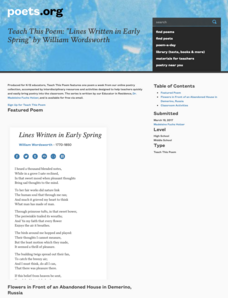





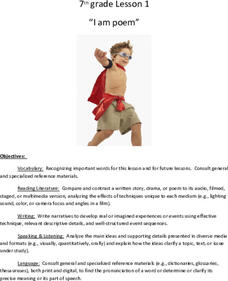
!["From Citizen, VI [On the Train the Woman Standing]," Claudia Rankine Lesson Plan "From Citizen, VI [On the Train the Woman Standing]," Claudia Rankine Lesson Plan](http://content.lessonplanet.com/resources/thumbnails/456347/large/u2nyzwvuc2hvdf8ymdizltazlte3x2f0xzeyljexljq2x1bnlnbuzw.png?1679080322)



